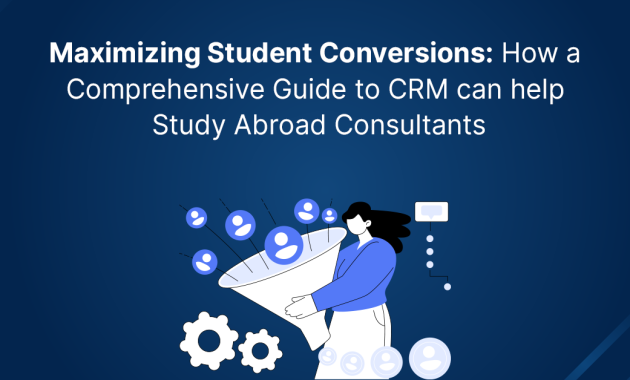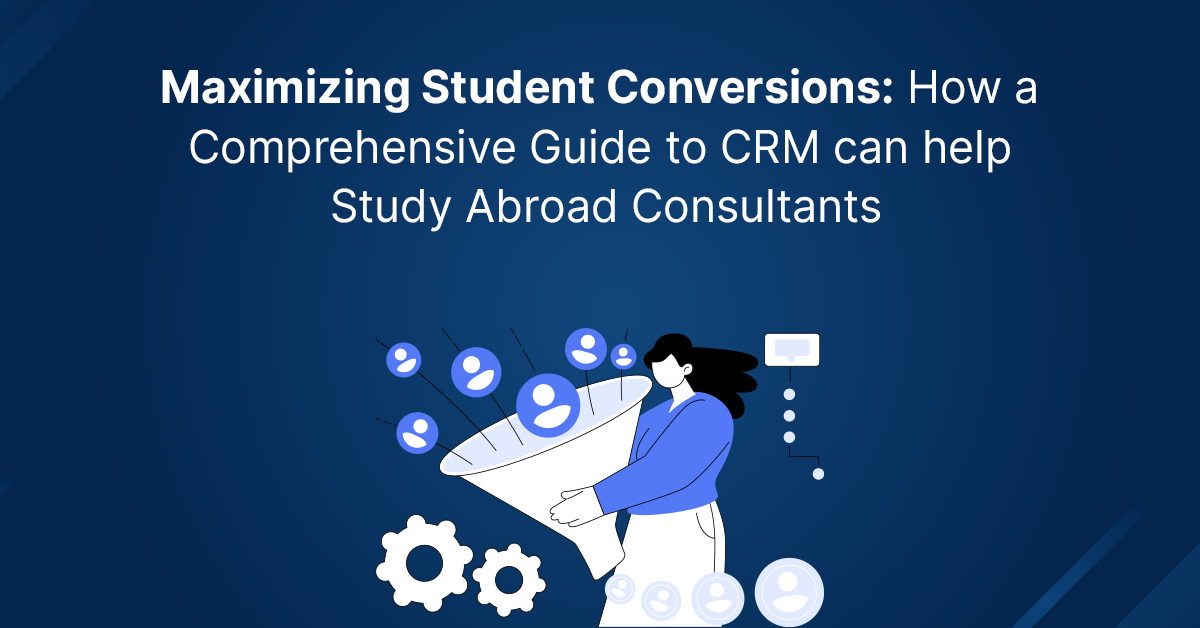
Learn to Maximize Conversions Using CRM Software: A Comprehensive Guide
In the fiercely competitive landscape of modern business, converting leads into paying customers is paramount. It’s no longer sufficient to simply attract attention; businesses must nurture relationships, understand customer needs, and guide prospects through the sales funnel effectively. Customer Relationship Management (CRM) software has emerged as the cornerstone of this process. This guide delves into how to maximize conversions using CRM software, providing actionable strategies and insights for businesses of all sizes. We’ll explore the core functionalities, best practices, and real-world examples to help you unlock the full potential of your CRM and drive significant revenue growth. The focus is on achieving measurable results and optimizing the customer journey.
Understanding the Power of CRM in Conversion Optimization
At its core, CRM software is designed to manage and analyze customer interactions and data throughout the customer lifecycle. This comprehensive view allows businesses to personalize their marketing efforts, improve sales processes, and deliver exceptional customer service. When implemented effectively, CRM becomes a powerful tool for conversion optimization. The ability to track leads, identify their pain points, and tailor communications accordingly is invaluable. Understanding the customer journey is crucial for effective sales. CRM provides the data to do just that. This helps sales representatives to close more deals.
Key Features of CRM Software for Conversion Enhancement
Several key features of CRM software directly contribute to increased conversions. These features, when utilized strategically, can significantly impact your bottom line. These are not just tools; they are strategic assets for improving conversion rates.
- Lead Management: CRM systems streamline lead capture, scoring, and qualification processes. This enables sales teams to prioritize the most promising leads, saving time and resources. Lead scoring helps to focus efforts.
- Sales Automation: Automation of repetitive tasks, such as email follow-ups and appointment scheduling, frees up sales representatives to focus on closing deals. Automated workflows improve efficiency.
- Contact Management: Centralized contact databases provide a 360-degree view of each customer, including their interactions, preferences, and purchase history. This facilitates personalized communication and targeted marketing campaigns. This helps in understanding customer behavior.
- Sales Pipeline Management: Visualizing the sales pipeline allows sales managers to track deals, identify bottlenecks, and forecast revenue accurately. This provides valuable insights into the sales process.
- Reporting and Analytics: CRM platforms offer robust reporting and analytics capabilities, providing insights into sales performance, customer behavior, and conversion rates. This data-driven approach enables continuous improvement.
Implementing a CRM Strategy to Boost Conversions
Simply investing in CRM software is not enough. A well-defined strategy is essential to maximize conversions using CRM software. This strategy should align with your business goals and address specific areas for improvement. A proper strategy increases the efficiency of the CRM.
- Define Clear Goals: Identify specific, measurable, achievable, relevant, and time-bound (SMART) goals for your CRM implementation. What do you want to achieve?
- Choose the Right CRM: Select a CRM platform that aligns with your business needs, budget, and technical capabilities. Consider factors such as scalability, integrations, and user-friendliness.
- Data Migration and Integration: Ensure seamless data migration from existing systems and integrate your CRM with other business applications, such as marketing automation tools and e-commerce platforms. This ensures data consistency.
- User Training and Adoption: Provide comprehensive training to your sales and marketing teams to ensure they understand how to use the CRM effectively. Encourage user adoption through incentives and ongoing support.
- Process Optimization: Analyze your existing sales and marketing processes and optimize them based on CRM data and insights. This improves efficiency.
- Continuous Monitoring and Improvement: Regularly monitor key performance indicators (KPIs) to track progress and identify areas for improvement. Continuously refine your CRM strategy based on data and feedback.
Leveraging CRM for Targeted Marketing and Personalized Experiences
One of the most significant advantages of CRM is its ability to facilitate targeted marketing campaigns and personalized customer experiences. By segmenting your customer base based on their demographics, behaviors, and preferences, you can tailor your messaging to resonate with each individual. This leads to higher engagement and conversion rates. Personalization is key to successful marketing. This increases customer loyalty.
- Customer Segmentation: Divide your customer base into distinct segments based on relevant criteria, such as purchase history, demographics, and engagement level.
- Personalized Email Marketing: Use CRM data to personalize email subject lines, content, and offers, increasing open rates and click-through rates.
- Behavioral Targeting: Trigger automated email campaigns based on customer behavior, such as website visits, product views, and abandoned carts.
- Lead Nurturing: Implement lead nurturing campaigns to guide prospects through the sales funnel, providing valuable content and offers at each stage.
- Website Personalization: Use CRM data to personalize website content and offers based on customer preferences and behaviors.
Maximizing Conversions at Each Stage of the Sales Funnel
CRM software can be instrumental in optimizing conversions at every stage of the sales funnel, from attracting leads to closing deals and retaining customers. Every stage is an opportunity to convert. It helps turn prospects into loyal customers.
- Attracting Leads: Integrate your CRM with your website, social media platforms, and marketing automation tools to capture leads effectively. Use lead magnets and compelling calls to action.
- Qualifying Leads: Implement lead scoring and qualification processes to identify the most promising leads and prioritize your sales efforts.
- Nurturing Leads: Use automated email campaigns, personalized content, and targeted offers to nurture leads through the sales funnel.
- Converting Leads: Equip your sales team with the tools and insights they need to close deals, such as detailed customer profiles, sales scripts, and proposal templates.
- Retaining Customers: Provide exceptional customer service and support to build customer loyalty and encourage repeat purchases.
Measuring and Analyzing CRM Performance for Continuous Improvement
To maximize conversions using CRM software, it’s crucial to measure and analyze its performance regularly. This data-driven approach allows you to identify what’s working, what’s not, and make informed decisions to improve your conversion rates. Measuring and analyzing is the key to success.
- Track Key Performance Indicators (KPIs): Monitor key metrics, such as lead generation, conversion rates, sales revenue, customer acquisition cost, and customer lifetime value.
- Generate Reports and Dashboards: Create custom reports and dashboards to visualize your CRM data and track progress towards your goals.
- Analyze Customer Behavior: Analyze customer behavior patterns to identify areas for improvement in your sales and marketing processes.
- A/B Testing: Conduct A/B tests to optimize your marketing campaigns, website content, and sales processes.
- Iterate and Improve: Continuously refine your CRM strategy based on data and feedback, making adjustments as needed.
Real-World Examples of Conversion Optimization with CRM
Several businesses have successfully used CRM software to maximize conversions using CRM software. These real-world examples demonstrate the power of CRM in action. These success stories provide valuable insights.
- Example 1: A SaaS company implemented a CRM system to track leads, automate email follow-ups, and personalize customer interactions. As a result, they saw a 30% increase in conversion rates and a 20% reduction in sales cycle length.
- Example 2: An e-commerce business used CRM data to segment its customer base and launch targeted email campaigns. This resulted in a 15% increase in click-through rates and a 10% increase in sales revenue.
- Example 3: A financial services company leveraged CRM to improve customer service and build customer loyalty. This led to a 25% increase in customer retention rates and a significant boost in referrals.
Common Challenges and How to Overcome Them
While CRM offers immense benefits, businesses may encounter challenges during implementation and usage. Addressing these challenges proactively is essential for success. Anticipating and solving problems is key to success.
- Lack of User Adoption: Ensure that your sales and marketing teams are properly trained and motivated to use the CRM effectively. Provide ongoing support and incentives.
- Data Quality Issues: Implement data validation processes and regularly clean your CRM data to ensure accuracy.
- Integration Problems: Carefully plan the integration of your CRM with other business applications to ensure seamless data flow.
- Complex Implementation: Choose a CRM platform that is user-friendly and easy to implement. Consider seeking help from a CRM consultant.
- Lack of Executive Sponsorship: Secure buy-in from senior management to ensure that your CRM implementation is a priority.
Conclusion: Embracing CRM for Conversion Success
Maximize conversions using CRM software is no longer a luxury; it is a necessity for businesses seeking sustainable growth in today’s competitive market. By leveraging the features of CRM, implementing a well-defined strategy, and continuously monitoring performance, you can transform your sales and marketing efforts. CRM is a powerful tool for success. Embrace CRM and unlock your business’s full potential. The key is to be consistent. The future of business is here.
[See also: How to Choose the Right CRM for Your Business] [See also: CRM Best Practices for Sales Teams] [See also: CRM and Marketing Automation: A Powerful Combination]

